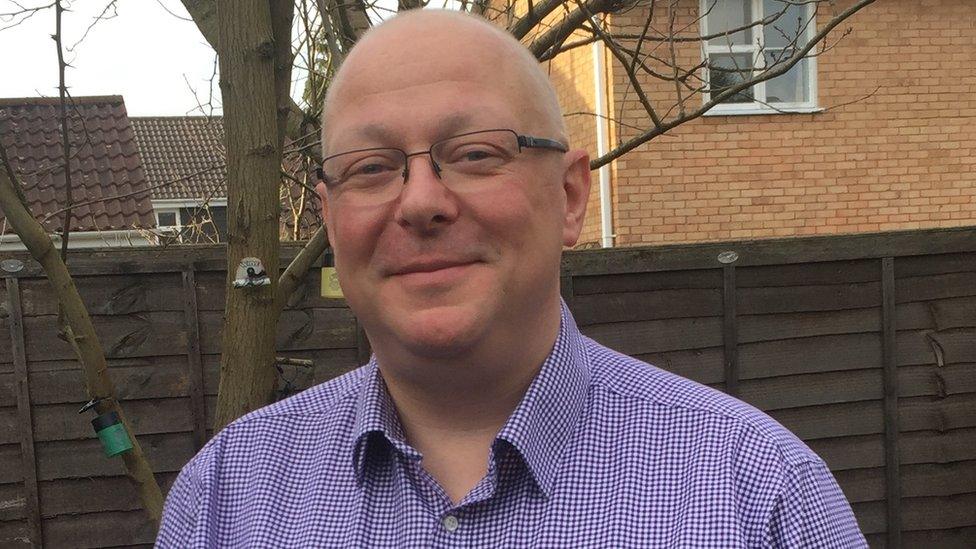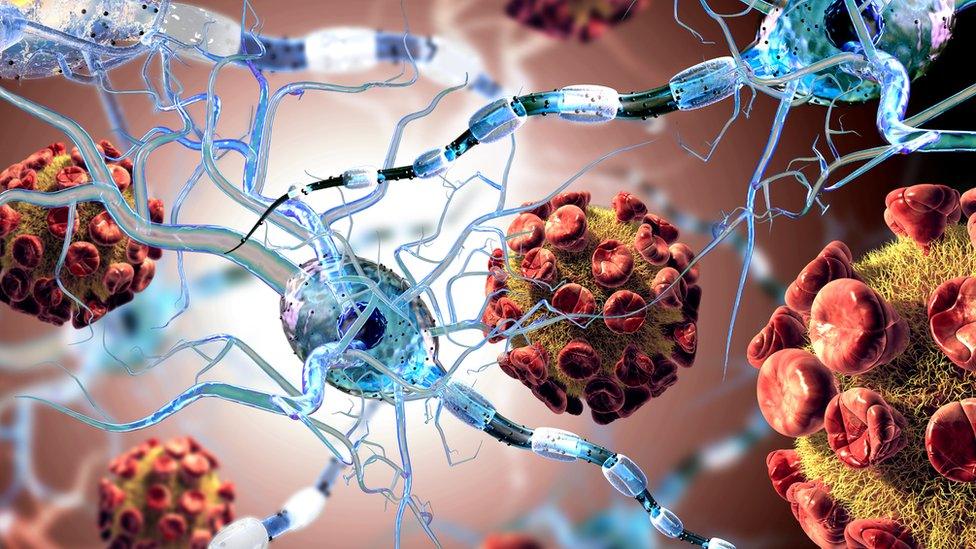Risky treatment can stop multiple sclerosis for years
- Published

A multiple sclerosis treatment being tested in patients can stop the disease for at least five years, say doctors.
The risky therapy involves wiping out the person's immune system with strong cancer drugs and then rebooting it with a stem cell transplant.
Doctors say only some patients will be suitable to try it, particularly because it is so high risk.
Out of 281 people who had the treatment, nearly half benefited, but eight died shortly afterwards.
The work in JAMA Neurology, external is one of the largest and longest investigations of this aggressive MS treatment.
Mark Rye, 41 and from Surrey, had his transplant just before Christmas 2016. Two months on he is doing well.

Mark Rye says he feels lucky to have been given the chance to have the treatment
"It was a hard decision, knowing what could go wrong. My wife and I discussed it for many, many hours. We've got small children and I didn't want my MS to get worse and end up in a wheelchair.
"I did this to halt the condition and so that I can be there for my children, who are still so young. I want to be able to play rugby and football with them as they grow up."
What is not clear is for how long the therapy might ultimately work.
Freeze frame
MS is incurable.
The disease causes the immune system to attack the protective coating of nerves in the brain and spinal cord, which can create problems with a person's vision, walking and balance.

Treatments aim to slow or stop the attack.
Researchers from Imperial College London gathered data from 25 centres in 13 countries that have been trialling the radical therapy known as autologous haematopoietic stem cell transplantation or AHSCT.
The idea behind the one-off treatment is to reset the immune system to stop it from attacking the body. But it requires toxic drugs to kill off existing cells in the patient's bone marrow, which is unpleasant and hazardous.
The medical trial data gives doctors and patients a better idea about who might benefit from the treatment.
The findings suggest that patients who are younger, who are not responding to other MS drugs and who have relapsing MS, might benefit from AHSCT.
Lead investigator Dr Paolo Muraro said the risks must be weighed up against the benefits.
"We previously knew this treatment reboots or resets the immune system - and that it carried risks - but we didn't know how long the benefits lasted.
"In this study, which is the largest long-term follow-up study of this procedure, we've shown we can 'freeze' a patient's disease - and stop it from becoming worse, for up to five years.
"However, we must take into account that the treatment carries a small risk of death and this is a disease that is not immediately life-threatening."
Advanced clinical trials are already under way to test how well AHSCT works compared to existing treatments for MS.
Last year, the BBC's Panorama programme was given exclusive access to several patients who have undergone the stem cell transplant.
Steven Storey was diagnosed with MS in 2013 and, within a year, went from being an able-bodied athlete to needing a wheelchair and losing sensation in much of his body.
He said: "I went from running marathons to needing 24-hour acute care. At one point I couldn't even hold a spoon and feed myself."
Fergus Walsh reports on the cancer treatment which is 'rebooting' the immune system of MS patients like Steven Storey
Within a few days of the transplant he was able to move his toes, and after four months he could stand unaided.
AHSCT is not routinely available on the NHS. If anyone with MS is considering it they should speak to their neurologist, advises the UK MS Society,, external which has been funding this and other research.
Follow Michelle on Twitter, external
- Published18 January 2016
- Published10 June 2016
